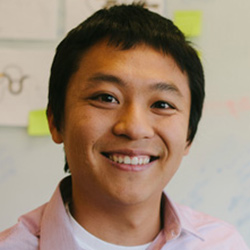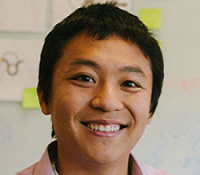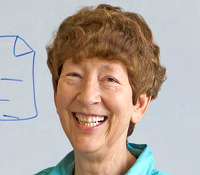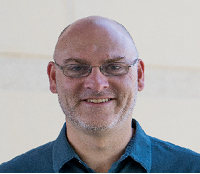
This week the Design Lab at UC San Diego will launch the latest edition of its Design@Large lecture series. For the Fall 2017 quarter, the series is organized by computer scientist and Cognitive Science professor Philip Guo, with all talks to take place in the CSE auditorium (Room 1202) every Wednesday afternoon at 4:00pm. The overall theme for the quarter is "Human-Centered Computational Tools." The first D@L lecture, on Oct. 4, will feature Northwestern University computer science professor Haoqi Zhang. All talks in the series are free and open to the public.
Computational Ecosystems: Tech-Enabled Communities to Advance Human Values at Scale

Date: Wednesday, October 4, 2017
Time: 4:00pm
Location: Room 1202, CSE Building
Guest Speaker: Haoqi Zhang, Northwestern University, Assistant Professor, Computer Science
*RSVP is Required.
[registration]
Abstract: Northwestern professor Haoqi Zhang will discuss how to advance community-based planning and research training.
Despite the continued development of individual technologies and processes for supporting human endeavors, major leaps in solving complex human problems will require advances in system-level thinking and orchestration. In this talk, I describe efforts to design, build, and study Computational Ecosystems that interweave community process, social structures, and intelligent systems to unite people and machines to solve complex problems and advance human values at scale. Computational ecosystems integrate various components to support ecosystem function; the interplay among components synergistically advances desired values and problem solving goals in ways that isolated technologies and processes cannot. Taking a systems approach to design, computational ecosystems emphasize (1) computational thinking to decompose and distribute problem solving to diverse people or machines most able to address them; and (2) ecological thinking to create sustainable processes and interactions that support jointly the goals of ecosystem members and proper ecosystem function.
I present examples of computational ecosystems designed to advance community-based planning and research training, that respectively engages thousands of people in planning an event and empowers a single faculty member to provide authentic research training to 20+ students. These solutions demonstrate how to combine wedges of human and machine competencies into integrative technology-supported, community-based solutions. I will preview what’s ahead for computational ecosystems, and close with a few thoughts on the role of computing technologies in advancing human values at scale.
Bio: Haoqi Zhang is the Allen K. and Johnnie Cordell Breed Junior Chair of Design and assistant professor in Computer Science at Northwestern University. His work advances the design of integrated socio-technical models that solve complex problems and advance human values at scale. His research bridges the fields of Human-Computer Interaction, Artificial Intelligence, Social & Crowd Computing, Learning Science, and Decision Science, and is generously supported by National Science Foundation grants in Cyber-Human Systems, Cyberlearning, and the Research Initiation Initiative. Zhang received his PhD in Computer Science and BA in Computer Science and Economics from Harvard University. At Northwestern he founded and directs the Design, Technology, and Research (DTR) program, which provides an original model for research training for 50 graduate and undergraduate students. With Matt Easterday, Liz Gerber, and Nell O’Rourke, Zhang co-directs the Delta Lab, an interdisciplinary research lab and design studio across computer science, learning science, and design.
MORE INFORMATION: RSVP on Eventbrite
Physical Computing for Everyone

Date: Wednesday, October 11, 2017
Time: 4:00pm
Location: Room 1202, CSE Building
Guest Speaker: Thomas Ball, Principal Researcher, Microsoft Research
*Registration is Required.
[registration]
Abstract: Thanks to Moore’s Law, embeddable microcontroller-based devices continue to get cheaper, faster, and include more integrated sensors and networking options. In 2016, the BBC and a host of technical partners, including Microsoft, delivered such a physical computing device, the micro:bit, to every 5th grader in the UK. Microsoft Research helped to make the micro:bit easy to program for novices. The non-profit Micro:bit Education Foundation (microbit.org), of which Microsoft is a founding partner, was recently created to take the micro:bit global. Over the last year, Microsoft has invested in a new web-based programming platform for physical computing in education, called Microsoft MakeCode (www.makecode.com). In this talk, I’ll describe the design principles behind the platform and our experience with it to date.
Bio: Thomas (Tom) Ball is a principal researcher and manager at Microsoft Research. Tom initiated the influential SLAM software model-checking project with Sriram Rajamani, which led to the creation of the Static Driver Verifier tool for finding defects in Windows device drivers. Tom is a 2011 ACM Fellow for “contributions to software analysis and defect detection.” As a manager, he has nurtured research areas such as automated theorem proving, program testing/verification, and empirical software engineering.
MORE INFORMATION: RSVP on Eventbrite
Gender-Inclusive Software

Date: Wednesday, October 18, 2017
Time: 4:00pm
Location: Room 1202, CSE Building
Guest Speaker: Margaret Burnett, Oregon State University, Distinguished Professor
*Registration is Required.
[registration]
Abstract: Gender inclusiveness in software companies is receiving a lot of attention these days, but it overlooks a potentially critical factor: software itself. Research into how individual differences cluster by gender shows that males and females often work differently with software for problem-solving (e.g., tools for programming, debugging, spreadsheet modeling, end-user programming, game-based learning, visualizing information, etc.). In this talk, I’ll present the first real-world investigation of software practitioners’ ability to identify gender-inclusiveness issues in software they create/maintain, using a method we call GenderMag. At the core of the method are 5 facets of gender differences drawn from a large body of foundational work on gender differences from computer science, psychology, education, communications, and women’s studies. Results from the field study were that software practitioners identified a surprisingly high number of gender-inclusiveness issues in their own software. We present these results and more, along with tales from the trenches on what it’s like to use GenderMag, where the pitfalls lie, and all the things we are still in the process of learning about it.
Bio: Margaret Burnett is a Distinguished Professor at Oregon State Unversity, an ACM Distinguished Scientist, and a CHI Academy member. Her research on gender inclusiveness in software — especially in software tools for programming and problem-solving — spans over 10 years. Prior to this work, most gender investigations into software had addressed only gender-targeted software, such as video games for girls. Burnett and her team systematically debunked misconceptions of gender neutrality in a variety of software platforms, and then devised software features that help avert the identified problems. She has reported these results in over 30 publications, and has presented keynotes and invited talks on this topic in 8 countries. She serves on a variety of HCI and Software Engineering committees and editorial boards, and on the Academic Alliance Advisory Board of the U.S. National Center for Women & Information Technology (NCWIT). More on Burnett can be found at: http://web.engr.oregonstate.edu/~burnett/
MORE INFORMATION: RSVP on Eventbrite
Project Jupyter: Design Considerations for Interactive Computing

Date: Wednesday, October 25, 2017
Time: 4:00pm
Location: Room 1202, CSE Building
Guest Speaker: Brian Granger, Cal State San Luis Obispo, Associate Professor, Physics and Data Science
*Registration is Required.
[registration]
Abstract: Project Jupyter is an open-source project that exists to develop software, open standards, and services for interactive and reproducible computing. The main application developed by the project is the Jupyter Notebook, a web-application that allows users to create documents that combine live code with narrative text, mathematical equations, and visualizations. Since its creation in 2011, the Jupyter Notebook has become a widely-used, open standard for developing, sharing, communicating, and reproducing computational work in scientific computing and data science. After introducing Project Jupyter and the ecosystem of projects around it, I will broaden the discussion to address the general design considerations for interactive computing and how those relate to 1) the underlying Jupyter software architecture and 2) ongoing work to design and build new user interfaces, such as JupyterLab, that better serve our users.
Bio: Brian Granger is an associate professor of physics and data science at Cal Poly State University in San Luis Obispo, CA. His research focuses on building open-source tools for interactive computing, data science, and data visualization. Brian is a leader of the IPython project, co-founder of Project Jupyter, co-founder of the Altair project for statistical visualization, and an active contributor to a number of other open-source projects focused on data science in Python. He is an advisory board member of NumFOCUS and a faculty fellow of the Cal Poly Center for Innovation and Entrepreneurship.
MORE INFORMATION: RSVP on Eventbite
To keep up with the rest of the Design@Large lecture series, be sure to bookmark the D@L web page. In November, speakers on the schedule will include CSE faculty members Leo Porter and Sorin Lerner, the Qualcomm Institute's Hari Garudadri, and Cecilia Aragon from the University of Washington.

